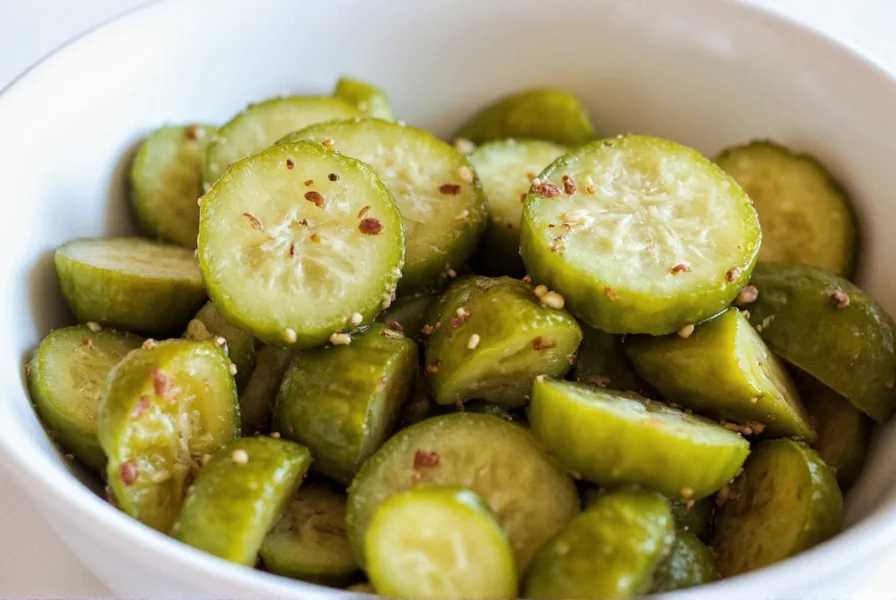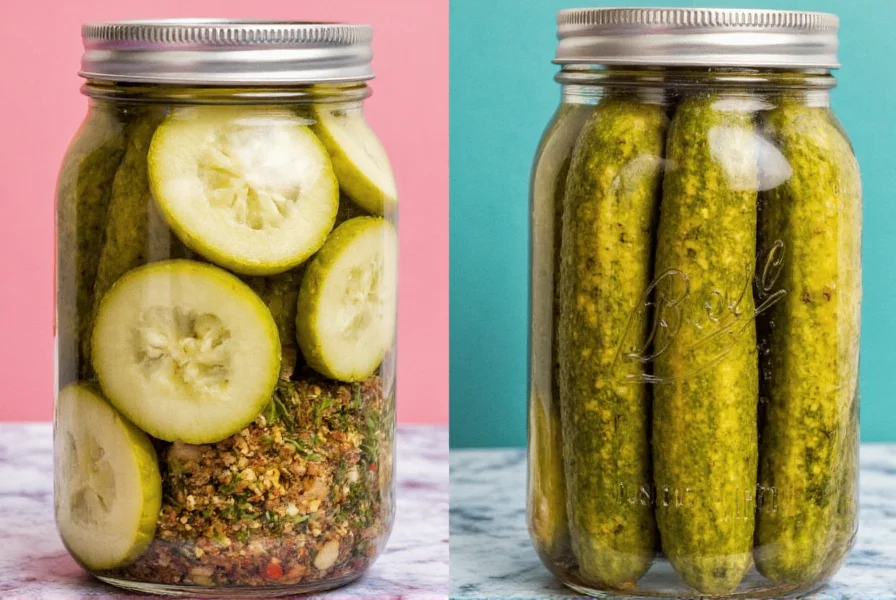What Are Pickle Seasonings and Why Do They Matter?
Pickle seasonings are specialized spice blends used to enhance flavor, texture, and preservation in pickled vegetables. These mixtures, typically containing mustard seed, dill, coriander, turmeric, and other herbs, transform simple cucumbers into gourmet snacks with crisp texture and complex taste profiles. According to the National Center for Home Food Preservation, proper seasoning is critical for achieving safe and delicious pickles, as spices contribute to both taste and microbial stability.
The Science Behind Pickle Seasonings: Beyond Just Flavor
Pickle seasonings do more than add taste—they play a vital role in preservation and texture. Here's why they're essential:
- Flavor Depth: Spices like coriander and mustard seed create layered tastes that salt and vinegar alone cannot achieve.
- Natural Preservation: Mustard seed, turmeric, and cloves contain compounds that inhibit bacterial growth, complementing vinegar and salt for safer pickling.
- Texture Preservation: Ingredients like calcium chloride (in some blends) maintain crispness by strengthening cell walls.
- Cultural Authenticity: Regional spice combinations define traditional pickles, from German dill to Indian mango varieties.
| Spice | Flavor Profile | Best Used With | Optimal Quantity per Quart | Key Benefit |
|---|---|---|---|---|
| Dill Seed | Fresh, herbal, slightly bitter | Cucumbers, green beans | 1-2 tsp | Classic pickle flavor foundation |
| Mustard Seed | Sharp, nutty, tangy | All vegetables, especially carrots | 1 tsp | Antimicrobial properties, emulsifies brine |
| Coriander | Earthy, citrusy | Beets, cabbage, onions | 1 tsp | Balances sweetness and acidity |
| Turmeric | Earthy, spicy, warm | Mangoes, cauliflower | 1/2 tsp | Color enhancement, anti-inflammatory |
| Black Pepper | Peppery, sharp | Any pickle, especially radishes | 1/2 tsp | Subtle heat without overpowering |
| Red Pepper Flakes | Hot, smoky | Carrots, jalapeños | 1/4-1/2 tsp | Controlled heat for spice lovers |
| Bay Leaf | Woody, floral, herbal | Eggs, mushrooms, cucumbers | 1 leaf | Complexity and aroma depth |
How to Create Your Own Custom Pickle Seasoning Blend
Professional picklers recommend these steps for balanced, flavorful blends:
- Base Selection: Choose 1-2 primary spices (e.g., dill seed for classic dill pickles, mustard seed for tangy varieties).
- Balance with Complementary Notes: Add 1-2 supporting spices (e.g., coriander for citrus, turmeric for earthiness).
- Add Heat or Brightness: Include small amounts of black pepper, red pepper flakes, or citrus zest for dimension.
- Layer Aromatics: Use 1-2 bay leaves or garlic cloves per quart for depth.
- Test and Adjust: Start with 1 tsp total spices per quart, ferment for 24 hours, then taste and adjust.
Example Blend: "Classic Dill" (per quart)
- 1.5 tsp dill seed
- 1 tsp mustard seed
- 0.5 tsp coriander
- 1 bay leaf
- 2 garlic cloves
- 0.25 tsp black pepper
| Brand Name | Key Features | Price Range | User Rating | Best For |
|---|---|---|---|---|
| Betz Garlic Dill | Organic, no additives, strong garlic-dill combo | $3.99-$5.99 | 4.8/5 (1,200+ reviews) | Cucumber pickles, traditional recipes |
| Primal Pantry Fermenting Packets | Kits with everything you need; probiotic-friendly | $6.99-$8.99 | 4.7/5 (850+ reviews) | Newbies, fermented vegetables |
| The Spice Lab Pickling Spice Mix | Bold, all-purpose, includes mustard seed and turmeric | $4.49-$6.99 | 4.6/5 (600+ reviews) | Brining meats & veggies, gourmet projects |
| Mrs. Wages Pickle Crisp Seasoning | Includes calcium chloride for crunch; fast-ferment ready | $2.99-$4.99 | 4.5/5 (2,100+ reviews) | Quick refrigerator pickles, crunchy textures |
Frequently Asked Questions About Pickle Seasonings
What are the essential spices for pickle seasonings?
The essential spices for pickle seasonings include mustard seed, dill seed, coriander, black peppercorns, and bay leaves. Mustard seed provides tanginess and antimicrobial properties, dill seed delivers classic pickle flavor, coriander adds citrus notes, black pepper offers subtle heat, and bay leaves contribute complexity. For specific applications, turmeric (for color), allspice (for warmth), or cinnamon (for sweet pickles) may be added. According to the USDA Food Safety and Inspection Service, these core spices form the foundation of safe, flavorful pickling.
How long do pickle seasonings last in the pantry?
Whole spices used in pickle seasonings typically last 2-3 years when stored in airtight containers away from heat and light. Ground spices have a shorter shelf life of 1-2 years. For best flavor, replace spices when they lose aroma. The National Center for Home Food Preservation recommends testing potency by crushing a small amount between your fingers—if no strong scent remains, it's time to replace.
Can I use fresh herbs instead of dried spices in pickle seasonings?
Yes, but with adjustments. Fresh dill is commonly used for dill pickles and provides brighter flavor than dried dill seed. However, fresh herbs introduce more moisture and may break down during fermentation. Use 3x the amount of fresh herbs compared to dried (e.g., 3 tbsp fresh dill for 1 tbsp dried). For best results, add fresh herbs during the final stages of pickling to preserve texture and flavor.
How much pickle seasoning should I use per jar?
Use 1-2 tablespoons of pickle seasoning per quart-sized jar for standard recipes. For pint jars, use 1-1.5 tablespoons. When creating custom blends, start with 1 tsp total spices per quart, ferment for 24 hours, then adjust. The USDA Food Safety and Inspection Service emphasizes that over-seasoning can affect brine balance and preservation safety.
Do pickle seasonings affect the preservation process?
Yes, but indirectly. Spices like mustard seed, turmeric, and cloves contain natural antimicrobial compounds that complement vinegar and salt. However, the primary preservation comes from proper acidification (pH below 4.6) and salt concentration. According to the National Center for Home Food Preservation, spices should never replace tested brine ratios—they enhance flavor and provide minor preservation benefits but cannot ensure food safety alone.
Can I reuse pickle seasoning from a previous batch?
No, it's not recommended. Spices release most flavor compounds during the first batch, resulting in weak flavor for reuse. More importantly, reused spices may harbor bacteria from previous fermentation, posing food safety risks. The USDA Food Safety and Inspection Service advises always using fresh seasonings for each batch to ensure safety and optimal taste.
Conclusion: Elevate Your Pickling Game with Science-Backed Seasonings
Whether you're a beginner or experienced fermenter, understanding pickle seasonings is key to creating consistently crisp, flavorful pickles. By using the right spice combinations, proper quantities, and trusted brands, you can transform simple vegetables into gourmet delights while ensuring food safety.
Start with the core spices listed above, experiment with custom blends, and always refer to USDA guidelines for safe pickling practices. Share your creations with confidence—your perfect pickle is just one batch away.












 浙公网安备
33010002000092号
浙公网安备
33010002000092号 浙B2-20120091-4
浙B2-20120091-4